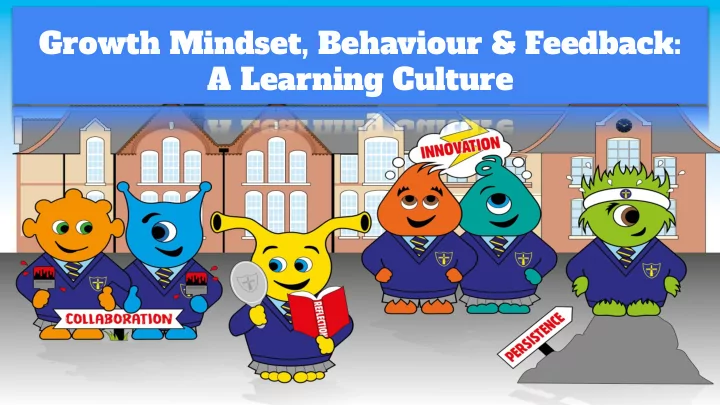

Growth Mindset, Behaviour & Feedback: A Learning Culture
Rationale We have started the journey in Growth Mindset but are embedding it further within the school this year. Key to this development will be processes, language and feedback
Working together for the good of all By using Growth Mindset, our school creates a culture for all children to flourish and reach their God-given potential but in a secure and nurturing, Christian environment. Our teaching culture as a result of this project has improved and teacher feedback shows an improvement in attainment… but what is this? To start this off. Let me highlight the importance of culture and language to you. Q: How many interactions does a person in business have in one hour?
Growth Mindset The idea comes from the research of the psychologist Carol Dweck. A mindset is simply a belief – a belief about yourself and your most fundamental qualities like ability, faith (or lack of it), personality, political views, talent and so on. We all have mindsets. They can be growth, fixed or a mixture of the two.
SLMT DOJO BOARD 765 1534 712 1000 I have rated with Dojo points that you have received for behaviour, not outcomes, so it is not academically related. How do you feel? How does this link to Growth Mindset?
Working together for the good of all We are a school that creates a culture for all children to flourish and reach their God-given potential but in a secure and nurturing, Christian environment. What am we changing? - No Red, Amber, Green walls or traffic lights in class - No individual rewards for expected behaviour - No golden time or extra playtime for expected behaviour - No thinking clouds or rain clouds But why - what is the impact?
Working together for the good of all AMG Gaby McWhinnie James Bawn David Walton Jane Isaac Rachel Lee
Working together for the good of all All classes need excellent behaviour management strategies that work. Our developments are supporting a culture of love, collaboration and excellence. How? - Behaviour expectations are led by expectation, not reward - Language is key - How do you show dignity and respect - loco-parentis - Growth Mindset - How this all links with feedback - How this all links with the classroom But why? - Culture, Loco-parentis, Impact on attainment and progress
Growth Mindset Are you fixed or Growth Mindset? Some people think they are Growth Mindset and are actually quite fixed mindset. We are changing this. Actions: - Language is crucial - Mr Bawn has led training with further training in November and January - We are ensuring staff understand research from John Hattie and Shirley Clarke on Visible Learning - encompasses a lot of these ideas - Celebrate failure: “Excellent mistake” is a phrase you will all be using - watch how this leads into Feedback and better teaching - How you use praise - we will look at this on next slide
Praise Staff have had training to give praise that should encourage a Growth Mindset approach. Some staff have had a lot of training on this (SLMT) and the impact is already being seen. We are providing further training for all staff - this is so we see the removal of superlative language and rewarding success over effort / progress. Our training will ensure a further cultural shift within these classes as well as the early adopters Actions: - No ego praise - do not praise the person, praise the behaviour - No praise (like Dojos or rewards or test scores) that pits children against each other - Never praise the quantity of work or finishing quickly. Success is working hard, not finishing quickly - Praise to some children is often targeted but others often get patronising well dones rather than targeted verbal feedback - Do you see how Growth Mindset flows into Feedback yet?
Next Steps Culture ● We are instilling a culture for teachers to act as a professional who is in a loco parentis role with language being key and following our Growth Mindset Principles Rewards ● No Dojos, no table marble jars, no R.A.G with names on ● Rewards for behaviour and linked to growth mindset ● Rewards are not for things they should be doing - no playtime for good behaviour - Let’s talk behaviour management
What else have we done: Classroom ● Desks in rows Random seats done weekly ● ● Any kids together - children need to learn how to sit and work with anyone ● Never praise speed or success - think how you felt in my dojo board - imagine if you are 7 Deliberately refer to mistakes as “fantastic mistakes” - the class will say well done to ● that individual ● Explain all these changes so children understand ● Each week, at the end of the week, have a compliment slip for the class to fill out on their partner to say why they enjoyed working with them. KEEP THEM ● Never start with hands up. Pick randomly. It is less hierarchical ● Blue cards - all classes to have blue cards they can put on their desk if they do not understand - peer support or teacher support can then be given
Using Growth Mindset as a mindset, not just the language will enable: - Communication and excellent Verbal Feedback - Verbal Feedback done well will lead to excellent Formative and summative assessment - Excellent communication and assessment will support relationships with children, improving behaviour management, which in turn is supported by Growth Mindset
Growth Mindset What is it? How does it link to behaviour? How does it link to feedback? How does it link to loving our children?
Any Questions?
Recommend
More recommend